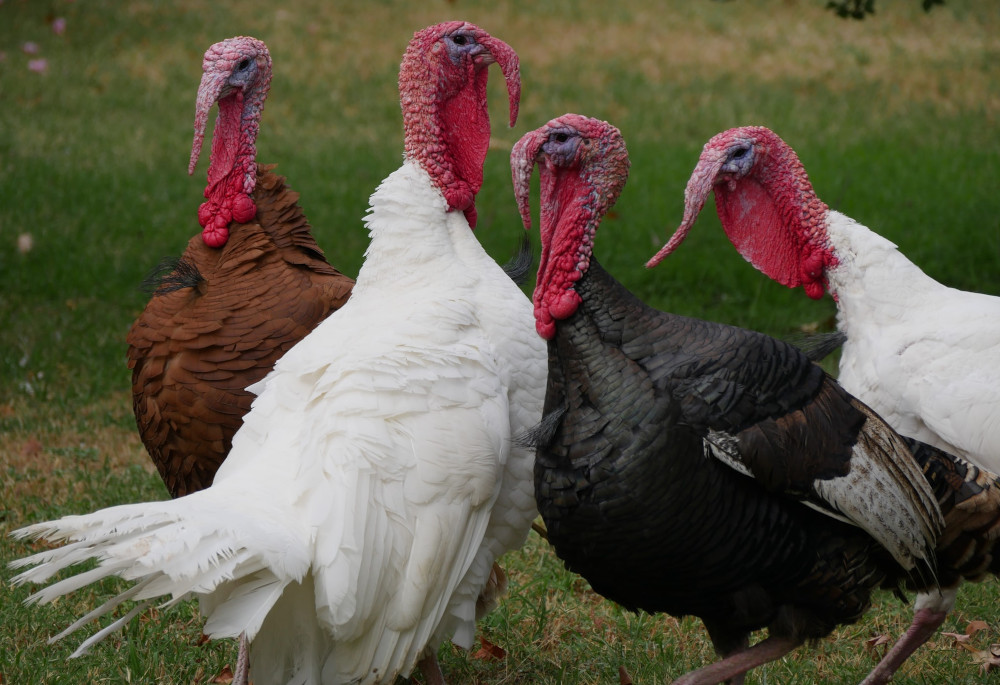Can you keep turkeys with other poultry?

You might have started raising turkeys and you are thinking of keeping turkeys with chickens, would that be a good move?
Table of Contents
For the most part is is advisable to raise turkeys separately from other domestic poultry. In my experience turkeys are quite calm and amicable around ducks and chickens but not Guinea fowl.
Can turkeys and chickens be kept together?
Turkeys and chickens can be raised together and share a coop. However, turkeys need more space than chickens, so make sure that your coop is large enough to accommodate both types of birds.
I have found that chickens and turkeys tend to just ignore each other especially if they live free range.
Can other poultry like ducks and turkeys live together?
Turkeys and ducks can share space. Turkeys are not as good swimmers as ducks so water in a big pond could be an issue.
Turkeys and geese can live together but they all really have to be free range. Geese can be aggressive towards turkeys, so make sure that there is enough space for the birds to avoid each other if necessary.
My Guinea fowl did not like my turkeys and even used to fight with them.
Can turkeys and chickens eat the same food?
Not really, although this is more of a problem for confined birds that are not getting the benefit of being free range.
Layers feed for chickens has too much calcium and not enough protein to be a good food for turkeys so you will always be making compromises when feeding a diverse flock.
You could mix the feeds to try and bring the best of both worlds.
Can You Keep Turkeys with Other Poultry? Pros and Cons:
Pros:
- Turkeys and other poultry can coexist peacefully and even form bonds.
- Turkeys can protect chickens and ducks from predators due to their larger size and strong instincts.
- Raising multiple types of poultry can add diversity and interest to your flock.
Cons:
- Turkeys require different nutritional requirements than chickens and ducks.
- Turkeys can transmit diseases to other poultry, such as blackhead disease.
- Turkeys are larger and more aggressive than chickens and ducks, which can result in injuries or even death.
Best practices for keeping turkeys with other types of poultry:
- Provide separate feeders and waterers for turkeys and other poultry. Turkeys require a higher protein diet than chickens and ducks, so they need their own feeders with turkey-specific feed.
- Keep turkeys and other poultry separated during feeding time. This will prevent competition and ensure that all birds get the nutrients they need.
- Monitor your birds for signs of illness. If you suspect that a turkey or other poultry is sick, quarantine them immediately to prevent the spread of disease.
- Provide plenty of space for your birds. Turkeys require more space than chickens and ducks, so make sure that your coop and run are large enough to accommodate them.
Most professional turkey growers are not open to the idea of mixing types of poultry as turkeys are highly susceptible to the Blackhead organisms. Mortality can be 100% if they contract the disease and they have not been protected with proper medication. A lot of chicken carry Blackhead organisms but these organisms have no apparent effect on them. One of the cardinal rules of turkey growers is avoid the practice of keeping turkeys with chickens.
What is Blackhead disease? And why is keeping turkeys with chickens not the best move a turkey grower could ever do?
Histomonas melagridis is a type of protozoan parasite present in turkeys, and are sometimes found in chickens and game birds producing the condition called Blackhead.
The incubation period of 15-20 days. Turkey transmission is deemed rapid despite the fact that it is not easy to infect birds orally. Recent studies show that infection may readily occur via cloaca or posterior opening when birds are on contaminated litter.
Symptoms of the disease in turkeys are depression, loss of appetite, poor growth, sulphur yellow faeces and cyanosis of head. There are several drugs available and are used by professional growers, though these drugs are not sold in small quantities or in some locations that are easily accessible to small growers.
What poultry can be kept together?
The best way to prevent Blackhead disease is to avoid keeping turkeys with chickens or other fowl animals. You have to maintain good sanitation in your turkey house. If possible, use concrete floors. You have to make sure to do regular worming to better control intermediate hosts.
Care, sanitation, and isolation are keys to a successful disease control program in turkeys. Some professional growers say that if turkeys are not care for properly, they will look for ways to die!